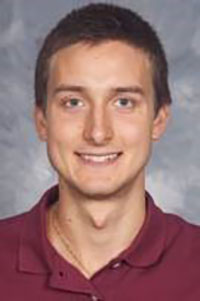
Third-year medical student Bryce Tyler de Venecia rotated with Wisconsin Voices for Recovery and Stop Heroin Now, two organizations that collaborate with the DFMCH, as part of the Chronic and Preventive Care block’s community health engagement project.
He says his experiences made him “really look at the stigma we apply to addiction,” and he appreciated being able to support organizations working to improve policy and community outreach around addiction.
When third-year University of Wisconsin School of Medicine and Public Health student Bryce Tyler de Venecia attended “Drop the Needle,” an awareness and fundraising event held in Milwaukee in July 2018, he saw firsthand the importance of destigmatizing the disease of addiction and the people who struggle with it.
“Each person’s story was more perspective changing,” he said, recalling people he met who drove for hours to receive treatment for addiction, or who had fought for years to get children back after overcoming addiction.
His experience was part of a 12-week community health engagement project with Wisconsin Voices for Recovery and its partner organization, Stop Heroin Now—both of which collaborate with the University of Wisconsin Department of Family Medicine and Community Health (DFMCH).
The project itself is a part of the Chronic and Preventive Care block in Phase 2 of the UW School of Medicine and Public Health’s ForWard curriculum.
Developing a County Resource Guide
Wisconsin Voices for Recovery is a statewide peer-to-peer recovery network housed in the DFMCH.
With funding from the Wisconsin DHS (principal investigator: DFMCH Associate Professor Aleksandra Zgierska, MD, PhD) and support from the DFMCH, the program offers education, connections to community resources and an advocacy platform focused on reducing stigma and promoting recovery.
It also awards seed funds through its ED2Recovery program to organizations, including recovery community organizations, for peer-to-peer services provided by recovery coaches and certified peer-support specialists to individuals with an opioid use disorder who are referred from emergency departments or other settings.
As part of their rotation with Wisconsin Voices for Recovery, medical students like de Venecia are helping to develop a county-by-county recovery resource guide for individuals, families, peer recovery coaches, or anyone seeking information on recovery support in their community.
“The biggest thing that struck each of us was the huge discrepancy between resources in more rural versus more metropolitan counties,” de Venecia says.
Sharing Stories Through Video Interviews
Stop Heroin Now is an all-volunteer organization that provides funding for individuals who couldn’t otherwise access sober living and recovery coaching; all the proceeds from last July’s Drop the Needle event supported its funding mission.
During that event—and at similar events such as September’s Rally for Recovery at the Wisconsin State Capitol—de Venecia conducted video interviews with people in recovery. With participants’ permission, these stories are posted on the Stop Heroin Now website as a way to build awareness and support.
“It was great to see how willing people were to share their story, break down that stigma and share what resources were most beneficial to them—so that other people can find help,” de Venecia recalls.
Insight into a Public Health Need
Participation in community health engagement projects gives students a deeper understanding of local and regional social issues that affect healthcare, insight into health disparities and increased awareness of how community organizations work in partnership with the UW School of Medicine and Public Health to address health priorities.
The experiences dovetail with the goals of the Chronic and Preventive Care block: to teach students the roles of clinicians, health care systems and communities in screening, treating and preventing chronic conditions.
“The experience made me really look at the stigma we apply to addiction,” de Venecia recalls. “As someone who wants to go into emergency medicine, it gave a human side to people who are struggling with this disease.
“Many people end up in the emergency department secondary to diseases of addiction,” he continues. “There’s a public health need out there, and it was great to be connected with these organizations to see what they’re doing to for policy, for community outreach—all the different tiers that it takes to enact public change.”
Published: April 2019 | Updated: April 22, 2019
